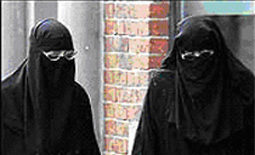Women of Birminghamabad find identity
 By Jonathan Guthrie
By Jonathan Guthrie
Financial Times
No symbol of cultural difference is more emotive in modern Britain than the headscarf. To many non-Muslims it represents the refusal to integrate, resistance to UK foreign policy and the oppression of women. But to wearers, the hijab has as many meanings as an onion has layers. It can even serve as a symbol of self-determination. So it is appropriate that Muslim women, hijab-wearers among them, are emerging tentatively into public life after years of invisibility within the UK’s highest-profile minority.
Superficially not a lot has changed since September 11 2001 in the predominantly Muslim district on the east side of Birmingham, Britain’s second largest city. The wares of the mini-markets – exotic fruit and vegetables, pots and pans and racks of clothes – still spill out on to the pavements along with the bhangra music. The men dress as they always did, in suits, sportswear or long shirts. The real difference is the proliferation among the women of hijabs, and beyond that niqabs (veils) and burqas (the all-enveloping black garment with mesh over the eyes).
Welcome to “Birminghamabad”, as the locally raised comedian and writer Shazia Mirza calls it. Muslims constitute one-fifth of the city’s population and their origins in rural Pakistan mean their attitudes can be conservative, even extremist. Men who allegedly plotted to murder a British soldier were arrested here. Moazzam Begg, another local, was held at Camp X-Ray in Guantánamo Bay. The city boasted a President Saddam Hussein Mosque, until a name change became expedient.
Yet east Birmingham’s most recognisable Muslim figure is not a fire-breathing imam but a slight, university-educated woman who is politically radical but religiously moderate. Salma Yaqoob, 36, is a councillor for Sparkhill and a member of the leftwing anti-war Respect party, led by the controversial MP George Galloway. She wears a hijab but takes issue with the idea of Muslim women as “timid wallflowers who need rescuing”. For her, the garment “is a feminist statement, showing I do not have to conform to fashion or make myself appealing to men”.
Although bitterly critical of UK participation in the invasions of Afghanistan and Iraq, Ms Yaqoob says, “Britain is a great place to be a Muslim. Difference is accepted and you can have a complex identity. I’m much more pessimistic about [continental] Europe because intolerance is so strong there.” Many of her battles have been within the Muslin community. The conservatives among them have accused her of “shamelessness” for speaking in public. But the mood is changing, she says, and some mosques now offer her a platform.
Naz Koser, a singer and arts entrepreneur, is another Muslim woman in search of venues. The main stage at the Glastonbury rock festival, one of big events of the British music calendar, would do nicely. Her pop group, the Divine Aubergines, presents the novel spectacle of women in headscarves singing in public. The name is multi-layered: “divine” because the lyrics are religious and “aubergines” because, according to Ms Kozer, eggplants “came from the east and were treated with suspicion at first”. Also, women in burqas are sometimes nicknamed “aubergines”, being dark and rounded.
Ms Kozer does not wear a burqa or a hijab. Instead, she has facial piercings and a poetic line from the Koran tattooed on her forearm. “Doing public shows is really important,” she says. “They give people a better understanding of Muslim women.” Performances can be doubly controversial because some Muslims disapprove of music itself , as well as of women performing it. Ms Kozer says the fiercest criticism comes from observant women, such as the niqab-wearer who disrupted a show.
“Would the Prophet, peace be upon Him, have behaved in that way?” asks Ms Kozer, 31, “No. He would not have judged me in five minutes. He would have listened.”
The struggle for British Muslim women is to forge an identity that is not imposed on them either by religious zealots or a British cultural mainstream some see as consumerist and immoral. Ms Kozer says: “My feelings vary day to day. A lot of young Muslim women really rock. But when you meet a 36-year-old who has to ask for permission to visit the shops, you feel pessimistic.”
Baroness Uddin, a Labour politician, equal rights campaigner and sporadic hijab wearer, talks of the “triple discrimination” faced by Muslim Asian women in the UK. The barriers range from traditions of obedience to men in the home through to prejudice in the jobs market and public life.
Yet she says Britain is “heaven” compared with France, where the hijab has been banned from some institutions, or Islamic countries where sexism is rampant. Monica Ali’s bestselling novel Brick Lane ends with a Muslim woman putting on skates and stumping cheerfully on to a public ice rink crowded with other Britons. Her real-life counterparts feel they are making progress towards acceptance too. It is just slow and wobbly going to begin with.


